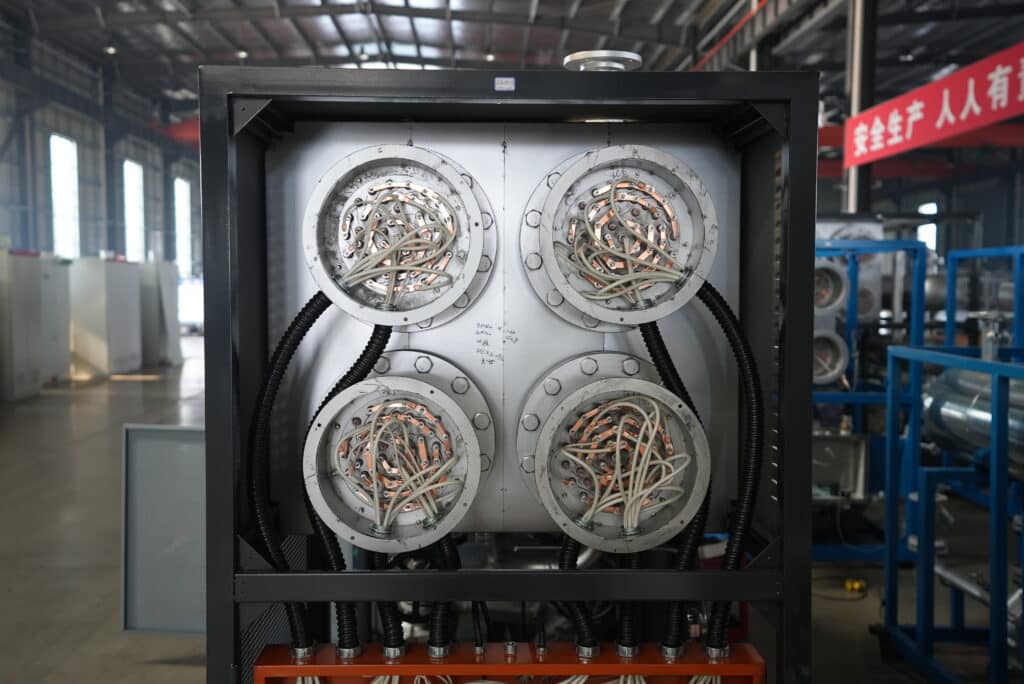Calculating the efficiency of a thermal oil boiler is a critical step in optimising boiler performance and reducing operating costs. By accurately assessing the efficiency of a boiler, it can help companies identify energy consumption problems and take effective measures to improve the overall performance of the system. This article will explain in detail the concepts, key factors and calculation methods related to thermal oil boiler efficiency.

Key factors in thermal oil boiler efficiency
Heat transfer oil boiler efficiency is an important indicator of boiler performance, mainly affected by the following key factors:
1. combustion efficiency
Combustion efficiency is the effective degree to which a boiler converts the chemical energy in the fuel into heat. High combustion efficiency means that the fuel is burned to its full capacity, reducing the waste of unburnt material.
- factor: The quality of the fuel, the design of the burner, and the control of the air supply all have an impact on combustion efficiency.
- Optimisation methods: Use of high-efficiency burners and adjustment of air ratios to ensure adequate combustion.
2. thermal efficiency
Thermal efficiency is an important indicator of the effectiveness of heat transfer from the boiler. That is, how much of the heat energy generated during combustion is effectively utilised and transferred to the heat carrier oil.
- heat loss: Heat loss is inevitable in boiler operation, including smoke loss, heat loss and incomplete combustion loss.
- Enhancement Methods: Reduce heat loss by improving insulation measures, lowering the exhaust temperature, etc., thereby increasing thermal efficiency.
3. Operating conditions of the system
Boiler operating loads, heat carrier oil circulation efficiency, and system maintenance conditions can also significantly affect boiler efficiency. For example, poor pipework insulation or inefficient circulating pumps in the system can lead to a reduction in overall thermal efficiency.
Calculation of heat transfer oil boiler efficiency
Boiler efficiency formulas are an important tool for evaluating the performance of a system, helping the user to understand exactly how the boiler is operating and to take steps to improve it.
basic formula
\text{Efficiency (%) } = \left( \frac{\text{thermal output}}{\text{thermal input}} \right) \times 100
- heat input: The total amount of heat released when a fuel is completely burned, usually calculated from the calorific value of the fuel and the fuel consumption.
- heat output: The effective heat supplied by the boiler to the heat carrier oil. This can be calculated by measuring the flow rate of the heat carrier oil, temperature changes, etc.
Example calculations
Assuming that a heat transfer oil boiler consumes 100kg of fuel per hour, the calorific value of the fuel is 40MJ/kg, and the heat carrier oil absorbs 3200MJ of heat per hour, the boiler efficiency is calculated as follows:
\text{Efficiency (%) } = \left( \frac{3200}{100 \times 40} \right) \times 100 = 80\%
This result indicates that the thermal efficiency of the boiler is 801 TP3T, of which 201 TP3T may be lost due to smoke evacuation, heat dissipation, etc.
How to improve the efficiency of thermal oil boiler?
Improving the efficiency of a thermal oil boiler can significantly reduce fuel consumption and operating costs while lowering the environmental impact. The following are some of the commonly used improvement measures:
1. Optimising combustion efficiency
- High-quality fuel is selected to ensure stable fuel composition.
- Clean the combustion chamber regularly to ensure that the burner is in good working condition.
- Use of flue gas analysers to monitor emission data and adjust combustion parameters in a timely manner.
2. Improved insulation systems
- Reduce heat loss from boiler surfaces with high performance insulation.
- Check that the insulation of pipes and valves is intact to prevent heat loss.
3. Reduced heat loss from exhaust smoke
- Equipped with a coal economiser (waste heat recovery unit) to recover the heat from the exhaust smoke for preheating the feed oil or air.
- Control the exhaust temperature within a reasonable range to avoid unnecessary energy waste.
4. Maintenance of boiler systems
- Regularly inspect and clean the surface of the boiler heat exchanger to avoid deterioration of heat transfer efficiency due to dirt and carbon build-up.
- Monitor the operating status of the circulation pump to ensure that the heat carrier oil circulates evenly through the system.
5. Intelligent Monitoring
- Installation of a boiler monitoring system for real-time monitoring of operational data, including parameters such as fuel consumption and heat carrier oil temperature.
- Optimise boiler operating modes through big data analytics to further improve efficiency.
Application areas of thermal oil boilers and the importance of efficiency
Heat transfer oil boilers are widely used in chemical industry, food processing, plastic manufacturing and other fields. In these industries, a highly efficient heating system not only reduces energy costs, but also improves productivity and reduces environmental pollution.
Example:
- Chemical industryThe heating of the reactor requires a precise and stable heat source, and an increase in the efficiency of the thermal oil boiler can directly improve the quality of the product.
- food processingThe high temperature stability required during baking and frying and the high efficiency of the boiler can significantly reduce energy costs.
Our company can non-standard custom products, click the menu bar to contact us to customise, you can also refer to the first!product pageAppreciate our company's products oh!
Recommended Reading:
